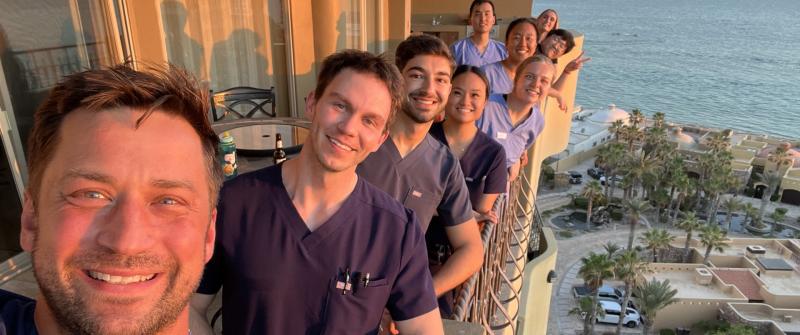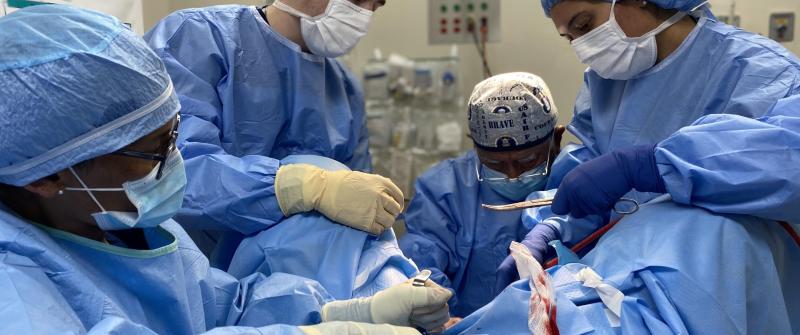Serving a Community in Need

Creighton medical students deliver compassion and care at Puerto Peñasco Surgery Clinic
A few hours’ drive from the Arizona border, in the coastal city of Puerto Peñasco, Mexico, Creighton University medical students on the Phoenix campus are gaining invaluable hands-on experience while serving a community in need.
The Puerto Peñasco Surgery Clinic, established in 2015, has become a vital educational resource for aspiring healthcare professionals and a lifeline for local community members lacking access to surgical care.
“The Puerto Peñasco Surgery Clinic merges compassionate care with education, bridging the gap in surgical access and nurturing a new generation of healthcare providers equipped with invaluable skills and a profound understanding of global healthcare dynamics,” said Emma Parenteau, a fourth-year Creighton medical student in Phoenix who is one of more than 50 Creighton medical students who have made the trip.
Creighton's commitment to educate outstanding, compassionate physicians
Floyd Roberson, MD’81, and Brian Wilhelmi, MD, assistant professor and chair of the Department of Anesthesiology, said the clinic is an extension of Creighton’s commitment to educate outstanding, compassionate physicians.
“Being able to share the experience of going out into the world to help others is something we hope to instill in our students through example and exposure. It is really wonderful to see the team get involved and dig into this international altruistic experience,” Roberson and Wilhelmi shared. Creighton students initially began professional outreach in Mexico at a medical clinic that did not include surgery resources. There, they witnessed numerous patients with hernias and gallbladder disease, highlighting the urgent need for surgical intervention.
To help address this need, they enlisted the expertise of skilled medical professionals from both the Creighton Phoenix community and Mexico. Soon, the Puerto Peñasco Surgery Clinic took shape, attracting a diverse group of physicians dedicated to providing essential surgical care to a population facing significant barriers in accessing such services.
Since then, the surgical clinic has flourished, establishing a vital resource within the community, and bonding the Creighton medical community and the people of northern Sonora, Mexico. A local family physician in Sonoyta, Mexico, now regularly sends patients in need to the clinic.
“Leveraging his family practice within the community, this practitioner facilitated the clinic’s outreach as a crucial resource to individuals experiencing financial constraints and lacking health insurance coverage,” Parenteau said.
A unique strength of the Puerto Peñasco Surgery Clinic lies in its role in education.
“By teaching clinical skills to Creighton medical students and residents, the clinic utilizes teaching funds to subsidize expenses for supplies, equipment, housing and meals,” Parenteau said. “This hands-on approach not only benefits aspiring medical professionals but also addresses the pressing surgical needs of disadvantaged populations.”

Health care at the Puerto Peñasco Surgery Clinic
Over the past nine years, approximately 200 procedures, predominantly hernia repairs (inguinal, umbilical, abdominal and incisional hernias) and cholecystectomies, have been performed at the Puerto Peñasco Surgery Clinic. Other procedures include hysterectomies, excision of ovarian cysts and various gynecological operations. The group of physicians also frequently handles upper extremity orthopedic cases and plastic-reconstructive surgeries, encompassing congenital malformations, traumatic injuries and assorted masses. Because the rented facility lacks a full hospital infrastructure, the surgical procedures are limited to those compatible with outpatient protocols.
“The impact of the surgical clinic transcends quantifiable measures,” Parenteau said. “It creates a support system for the underserved communities in Sonoyta and Puerto Peñasco, providing solutions to longstanding surgical issues that were previously insurmountable. Furthermore, it empowers students and residents to navigate operations in resource-constrained environments, fostering empathy and adaptability in dealing with challenges characteristic of healthcare systems in developing regions.”
